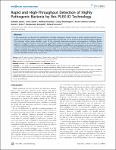Rapid and high-throughput detection of highly pathogenic bacteria by Ibis PLEX-ID technology
Jacob, Daniela
Sauer, Ursula
Housley, Roberta
Washington, Cicely
Sannes-Lowery, Kristin
Ecker, David J.
Sampath, Rangarajan
Grunow, Roland
In this manuscript, we describe the identification of highly pathogenic bacteria using an assay coupling biothreat group-specific PCR with electrospray ionization mass spectrometry (PCR/ESI-MS) run on an Ibis PLEX-ID high-throughput platform. The biothreat cluster assay identifies most of the potential bioterrorism-relevant microorganisms including Bacillus anthracis, Francisella tularensis, Yersinia pestis, Burkholderia mallei and pseudomallei, Brucella species, and Coxiella burnetii. DNA from 45 different reference materials with different formulations and different concentrations were chosen and sent to a service screening laboratory that uses the PCR/ESI-MS platform to provide a microbial identification service. The standard reference materials were produced out of a repository built up in the framework of the EU funded project “Establishment of Quality Assurances for Detection of Highly Pathogenic Bacteria of Potential Bioterrorism Risk” (EQADeBa). All samples were correctly identified at least to the genus level.
No license information

